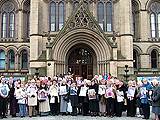Action Mesothelioma Day 2006
Date published: 03 March 2006
This week, public awareness has been raised about a terminal asbestos cancer called mesothelioma.
To mark the inaugural Action Mesothelioma Day, a protest and meeting was held at Manchester Town Hall. It was attended by over 200 asbestos cancer victims and families from Rochdale and throughout Greater Manchester. Many had worked at Turner & Newall sites in Spodden Valley, Rochdale and the North West.
Also represented were other asbestos cancer victims who had not worked in the asbestos industry but had been exposed to asbestos from their work. These included: garage mechanics, painting contractors, school teachers, engineers, construction workers and housewives that had washed their husband’s dusty overalls.
On the steps of Manchester Town Hall, people who have lost family members to asbestos disease held photographs of their loved ones aloft for the press and TV cameras.
Similar events were held throughout the UK including: Glasgow, London, Runcorn, Liverpool, Newcastle, Leicester, Sheffield, Chesterfield and Barrow-in-Furness.
The meetings coincided with the presentation of the British Lung Foundation’s Action Mesothelioma Charter to Downing Street. The Charter calls for more research into asbestos-related illness and better treatment for sufferers.
Following the Downing Street visit, a well attended reception was held at Westminster for Parliamentarians.
Later, at Manchester Town Hall, over 200 people attended a 2 hour meeting organised by the British Lung Foundation and the Greater Manchester Asbestos Victim Support Group.
TV and radio reports included interviews with people who have been diagnosed with mesothelioma:
James Hilditch explained how he was exposed to asbestos over 30 years ago whilst working for a scrap metal company. His employers never provided him with a mask or warned him about the dangers of asbestos. He is now paying for this with his life.
A young-looking 59 years of age, Mr Hilditch described the shock of being told by doctors that he has a terminal cancer. He had never heard of mesothelioma before being diagnosed.
Dame Helena Shovelton, chief executive of the British Lung Foundation, has described mesothelioma as the “forgotten cancer”:
Dame Helena explained:
“We are trying to make sure that younger people, who might be thinking this has all gone away as a problem – particularly people working in the building trade or doing DIY – take proper care.”
At the Manchester meeting Hugh Robertson of the TUC explained that if asbestos regulations are not improved, it is estimated that an additional 8,000 people may die from asbestos disease from future exposure to asbestos. His source for this figure was the Health and Safety Executive Consultation Document (CD 205):
http://www.hse.gov.uk/consult/condocs/cd205.pdf
Mr Robertson told the audience that the Government is currently consulting on amendments to the Asbestos at Work Regulations, but many fear that the draft amendments are too weak and enforcement of existing regulations inadequate. This concern was also expressed by Rochdale MP Paul Rowen in parliament last month, as reported on Rochdale online and Hansard:
http://www.rochdaleonline.co.uk/News/spodden_news.asp?ID=1320
halltext/60131h01.htm#60131h01_spnew11
The Trades Union Congress launched Action Mesothelioma Day with an awareness campaign to highlight the dangers of asbestos that could still be lurking in up to 1.5 million shops, factories and offices across the UK.
Mr Robertson suggested that many employers are either unaware of their legal obligations to manage asbestos risks or are simply choosing to ignore them. To the shock of the audience, it was explained that the average workplace is visited by a safety inspector on average only once every 8 - 20 years. It was suggested that some negligent employers exposing their workforce to asbestos could be safe in the knowledge that they are unlikely ever to get found out.
One million 'Asbestos Kills' stickers and thousands of leaflets have been sent to workplaces up and down the country, so that union safety reps can do more to stop employers needlessly exposing their staff to asbestos...
http://www.tuc.org.uk/extras/AsbestosPoster.pdf
Professor Thatcher from Christies and Wythenshawe hospital explained that despite asbestos cancer being the biggest occupational killer in the UK- there is almost no government funding available to find a cure.
HSE Kate Carroll from the Health and Safety Executive Asbestos Policy Unit confirmed that exposure to all types of asbestos - including chrysotile (white asbestos) - can cause cancer and that strict safeguards must be enforced to ensure that workers and the public are kept safe.
Mrs Eason, whose husband died from mesothelioma expressed a view held by many at the Manchester meeting:
“My husband, Michael Eason, died from mesothelioma. He was 63 years old. The pain and suffering he endured was horrendous and my son and I are furious that Michael, who looked after himself and never smoked in his life, died because of negligence in his place of work. There are more and more cases of mesothelioma. People must be made aware of this terrible cancer”
Do you have a story for us?
Let us know by emailing news@rochdaleonline.co.uk
All contact will be treated in confidence.
Most Viewed News Stories
- 1Off-licence found with weapons and drugs punished by council
- 2Local veterans’ charity receives big support from national logistics companies
- 3Police appeal for further witnesses to incident in Queen's Park
- 4Milnrow schoolgirl cleans up streets with school litter-picker – and hopes to inspire others to do...
- 5Rochdale community group founder recognised for contribution to research engagement with South...
To contact the Rochdale Online news desk, email news@rochdaleonline.co.uk or visit our news submission page.
To get the latest news on your desktop or mobile, follow Rochdale Online on Twitter and Facebook.



